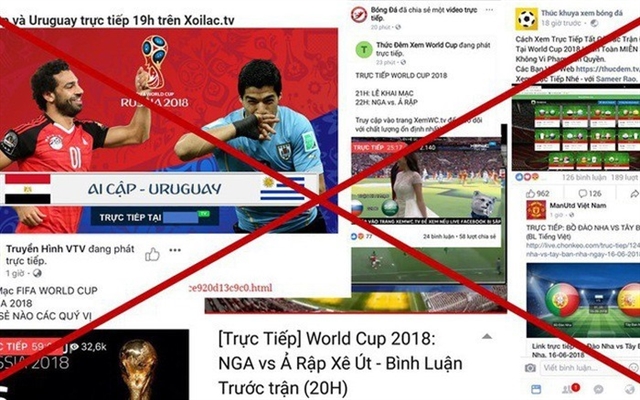 Economy
Economy


|
| Numerous football piracy websites in Việt Nam. Photo laodong.vn |
HÀ NỘI — Despite growing awareness and a strong willingness among Vietnamese users to pay for legal digital services, content piracy in Việt Nam remains high, posing serious threats to the digital economy.
According to recent surveys by the Coalition Against Piracy, in Việt Nam, 71 per cent of Vietnamese users said they are willing to pay for legal services if pirated platforms are blocked. However, 56 per cent admitted they had accessed pirated digital content within the past 12 months. 62 per cent of surveyed users said they had stopped paying for legal content because they could find it for free from illegal sources.
The most common forms of piracy include using Android boxes or similar devices, visiting illegal streaming websites and apps and sharing infringing content via social media or messaging platforms.
These actions are causing significant economic losses.
In 2022 alone, Việt Nam was estimated to have lost nearly US$350 million due to digital piracy. Globally, in 2023, music, film and television industries lost around $65 billion from copyright violations.
At a meeting on this issue on Tuesday, Matthew Cheetham, general manager of the Coalition Against Piracy under the Asia Video Industry Association, said users increasingly understand the risks of piracy – not only to the economy, but also to themselves. Sites with pirated content are 16.7 times more likely to infect users with malware than sites with legal content. For illegal streaming platforms, that risk rises to 21.7 times.
Cheetham cited Indonesia as a good example of the difference that fighting piracy can make. Since 2020, the country has stepped up website blocking efforts. As a result, traffic to pirate sites has dropped, while visits to legal platforms have increased. Notably, users not only stopped visiting the blocked sites, but also reduced their usage of other pirated services.
In Việt Nam, 53 per cent of users said they would stop accessing pirate websites if those sites were blocked, highlighting the effectiveness of site-blocking measures.
Blocking pirates is not enough
While blocking pirate websites is a necessary step, experts warn it is not sufficient on its own.
CEO of Thủ Đô Multimedia Nguyễn Ngọc Hân noted that hackers can still steal content in other ways.
For example, they can purchase a legal account and then use hardware devices to record content from screens or HDMI connections. In such cases, tracking the origin of leaked content requires identifying the account or device used.
He added that piracy is becoming harder to control due to rapid digital expansion and cross-border violations. Tools like VPNs make it easier for pirates to bypass geographic restrictions and access foreign content illegally.
"To support website blocking, tech companies should add extra protection to DRM solutions. Piracy is now very complex, so we need smart reports on trends and methods to create better protection strategies," Hân said.
Nguyễn Vũ Hoàng, head of Technology and Service Development at VTV Digital, said that as Việt Nam’s largest content producer, VTV is also among the services most affected by copyright infringement.
With over 50 million app installs and plans to expand paid channels from 2025, VTVGo is under pressure to strengthen copyright protection. In response, the platform has adopted various technologies such as watermarking, geo-blocking, encryption, access detection, user authentication and digital evidence storage.
Based on global experience, Aaron Herps, head of digital content protection for the Premier League, recommended maintaining frequent and fast blocking of pirate sites, expanding blocks to related domains and video sources and using detection tools to keep blacklists updated.
He also stressed the need for effective but balanced blocking policies and regular assessment of their impact to improve enforcement.
Experts agree that digital piracy cannot be stopped by technical or legal means alone. A combination of technology, enforcement, education and cross-border cooperation is essential to protect copyrighted content in Việt Nam’s growing digital ecosystem. — BIZHUB